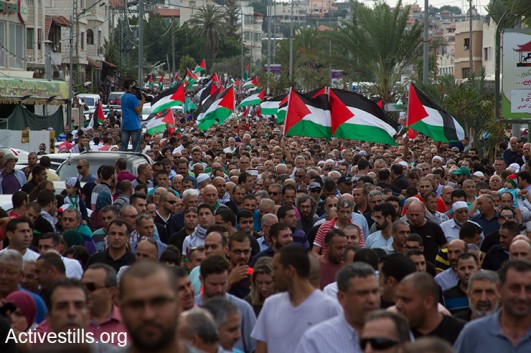Black American activists have delivered a powerful message to Palestinians and other oppressed communities around the world: you are not alone in your causes.

Of all the discussions I ever had about the Israeli-Palestinian conflict, undoubtedly the most engaging ones were with delegations of black Americans who visited the region to learn firsthand about Palestinians in the occupied territories, inside Israel, and in refugee camps. These groups – made up of community organizers, students, journalists, judges, and others – not only found commonalities with the experiences of Palestinians, but shared their own lessons of struggle against racism, state violence, and inequality.
The “Invest-Divest” chapter of the platform of the Movement for Black Lives (M4BL) is an outcome of that growing exchange between black Americans and Palestinians. The chapter, which partly addresses foreign policy concerns in various countries, outlines clear and practical ways for Americans to help in ending the Israeli occupation. These include engaging the Leahy Law to withdraw military aid for human rights violations; campaigning against private security companies like G4S; and fighting state legislation aimed at silencing BDS activism in the U.S.
The platform’s alliance with the Palestinian struggle – including its support for BDS, which was founded by a Palestinian civil society coalition much like the M4BL – has raised the public profile of the Palestinian cause at a very critical time. The political leaderships in Palestine, Israel, and the U.S. have shown little will or legitimacy to make progress in the conflict, leaving grassroots and civil society movements as the only agents actively challenging the worsening status quo. Thus by including their cause among their international priorities, black activists have delivered a powerful message to the Palestinian people: you are not alone in your struggle.

At the same time, the M4BL arguably overstepped its position when it used the word ‘genocide’ to describe Israel’s oppressive policies toward Palestinians. The problem here is not mere semantics and arguments over definitions. Many people like myself have lived and learned alongside survivors and descendants of survivors of genocides in Sudan, Rwanda, Armenia, and the Holocaust, to name a few. For all the crimes that Palestinians are subjected to, placing our situation on the same pedestal as history’s most egregious and murderous atrocities gives us an unwarranted exceptionalism which, in my view, undermines the transnational consciousness that we are trying to promote. The M4BL is certainly right to criticize groups that have disavowed their platform simply because of one word; but it should also remember that not all critiques of that word are baseless or ill-intended.
This minor debate, however, should not detract from the fact that the M4BL platform remains a phenomenal document. It is first and foremost a milestone in the struggle for racial and social justice in the United States. But its importance may prove to spread well beyond its borders as well, and not just in Palestine. For one, the platform is a demonstration of the power, resilience, and practicality that organized grassroots movements can have to shape the fate of discriminated and disenfranchised communities. Furthermore, the platform brilliantly articulates an intersectional worldview that rightly sees the world’s problems as deeply intertwined, and vividly shows how injustices abroad can be facilitated by injustices at home.
The M4BL platform is not the first to promote this kind of vision. But it does revive the hope that social movements can still influence the politics of the future, especially at a time when many of today’s younger generations are disillusioned with such movements (such as those that led the 2011 Arab Uprisings). The Black Lives movement can therefore take great pride in knowing that, in the same way their parents and grandparents inspired the world with the civil rights struggles of the 1950s and 1960s, so too are they generating that inspiration today – and Palestinians will be among the first to thank them for it.

